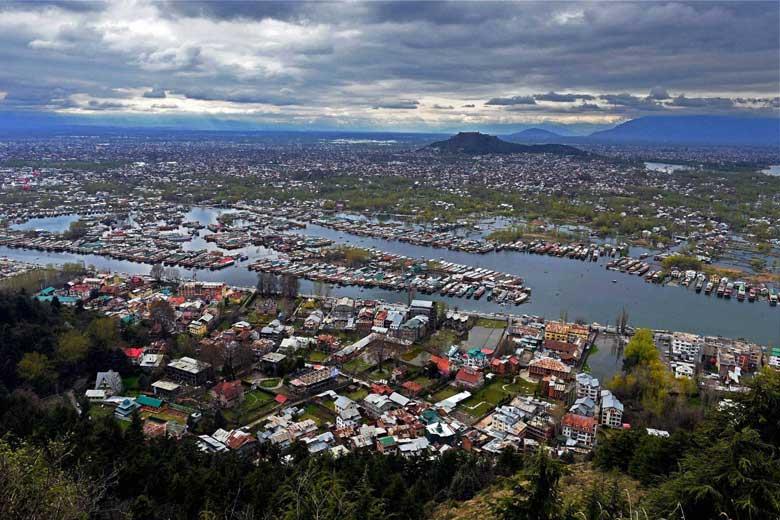
An American Journalist Lays Out Lively Kashmir Journey
AWARD-winning American journalist David Lepeska's first full-time reporting job was for the Kashmir Observer, from the summer of 2006 until mid-2007. His new book, Desiccated Land: An American in Kashmir, highlights the time he spent in Kashmir and his KO reporting from that period, alongside personal and geopolitical observations about South Asia.
KO: The book is a blend of reportage, memoir and travelogue. How did you arrive at this unique way of telling the Kashmir story? And how did you approach weaving these disparate elements together?
David Lepeska: Well, it wasn't easy. It all started when KO editor Sajjad Haider came to me in the summer of 2020 and said that Kashmir Observer's 25th anniversary year is coming up and we want to release a few books in conjunction with that. He said his initial thought was collecting my writing for the paper and he'd talked to a publisher who expressed interest.
My immediate thought was, well, we can't just put 15-year-old news reports and features together in a book. It would need some context, to present it to the reader in a way that sheds light on how they were created, the circumstances, the personal journey, the reality. What did these writings mean at the time and what do they mean now?
I remembered that while I was living in Kashmir I'd kept a personal blog. That was the age of the blog - long before podcasts. So I was blogging every week, maybe every few days, and I dug up a handful of those old blog posts and put them alongside my Kashmir Observer reports from 2006-7 and they helped flesh out the reality of that time in Kashmir.
So you've got the Kashmir Observer reports, you've got my blog posts from that period, and then to explain it all, to add context and insight, I added a good deal of new writing - the introduction, the epilogue, little intros to the chapters and some of the articles. The book contains 50-60 pages of new writing, almost a quarter of the total, so the reader bounces back and forth between the past and the present, hopefully learning about both as they go.
This seemed the only way to do this: sharing the old KO articles, showing my life at that time and explaining how I got to that point and how Kashmir got to that point, by intertwining my personal story with the history of Kashmir. I also examine how my experiences and Kashmir's reality fits into my broader worldview. Does it work, as a book? I've gotten some good feedback, so I feel like I did okay. I hope people give it a chance.
In your book you detail how you were drawn into journalism by 9/11, wanted to find a Muslim region to report from, and ended up coming to Kashmir and Kashmir Observer – in part because you had visited Kashmir years before as a tourist and enjoyed your time here. So, upon returning to Kashmir as a journalist in 2006, what were your impressions? Did the Valley and its people seem different once you lived and worked here? What stood out about your initial weeks reporting for Kashmir Observer?
Of course I found Kashmir beautiful. The food was fantastic. The people were so kind, helpful and warm. I felt close to everybody almost immediately. Those were my first impressions.
And then I started my work at Kashmir Observer. Sajjad was very open and helpful and just made me feel comfortable and welcomed. And I remember being surprised about how calm everybody seemed in the office at Kashmir Observer. Also about the journalism community in general, that whole community of people. Coming from the West, I expected Kashmir to be a very high pressure place, a very stressed out and anxious place, because of the regular violence, the persecution and the constant trauma. Just the inability to control one's situation, the inability to find relief, to ensure security and stability, for yourself and your family and your community. Being an American, I imagined all that would be absolutely debilitating, paralyzing mentally and emotionally.
But of course, unless you find a way to accept that, you're just going to go crazy. You're gonna be incredibly stressed and anxious all the time and it's gonna keep you from doing anything productive, from having a real life. So within a few weeks I came to realize that Kashmiris had found a way to adapt to a difficult, high stress, high pressure, impossibly traumatic environment. It taught me a lot about being a reporter, especially in conflict zones and dangerous and difficult situations, and just a human being dealing with trauma.

Legal Disclaimer:
MENAFN provides the
information “as is” without warranty of any kind. We do not accept
any responsibility or liability for the accuracy, content, images,
videos, licenses, completeness, legality, or reliability of the information
contained in this article. If you have any complaints or copyright
issues related to this article, kindly contact the provider above.
Most popular stories
Market Research

- New Cryptocurrency Mutuum Finance (MUTM) Raises $15.8M As Phase 6 Reaches 40%
- Noveba Brings Apple Pay To Customers
- Mutuum Finance (MUTM) Approaches Next Phase With 14.3% Price Increase After Raising $16 Million
- Cregis And Kucoin Host Institutional Web3 Forum Discussing Industry Trends And Opportunities
- Primexbt Expands Crypto Futures With 101 New Coins, Delivering Best-In-Class Trading Conditions
- BTCC Exchange Announces Triple Global Workforce Expansion At TOKEN2049 Singapore To Power Web3 Evolution




















Comments
No comment